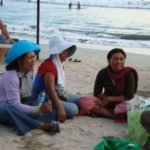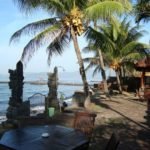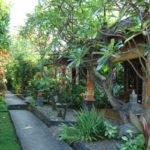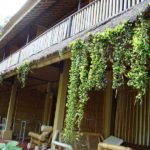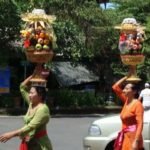Two Backpacks

Chapter 2 - We're on our way to Bali!
We’re on our way to Bali! The plane’s sudden acceleration pushes me back into my seat as we roar along the runway, the lumbering mass of metal becoming a graceful bird as we begin to climb into the clear blue skies above Perth, bound for Singapore.
Excited at what lies ahead, I take Ron’s hand in mine.
Gazing down at the now-familiar layout of the city, I recall the first time I saw Perth from the air. I’d arrived from China, determined to build a life with Jak, only to have my hopes and plans dashed three years later when he decided our relationship was at an end. Then I met Ron. We moved in together a few months later.
I squeeze Ron’s hand again and smile. I still can’t believe we’re on our way. The last few days have been a whirlwind of last-minute chores and farewells. Our possessions are stored; the keys to our rental returned. All I want now is the chance to relax for a while.
We plan to spend a year in Southeast Asia before flying to the UK to see family and friends, after which we hope to travel to South America.
We’ve purchased our one-way tickets from Perth to London, with Singapore as our stop-over and acquired ninety-day visas for Indonesia and China (obtained via the consulates in Perth). Once we complete our trip to China, we have no set timescale apart from being in Singapore in a year to catch our flight to London.
**********
I’d been to Singapore before, so I was confident I could find our hostel, Fernloft, for the night.
‘I’m sure it’s around here somewhere,’ I mutter, more to myself than Ron.
‘Let me have a look,’ he offers, holding out his hand for the hostel’s details I’d printed out before our departure.
‘Looks like we’re in the right area,’ Ron offers after a minute or two. ‘Why don’t you ask someone for directions?’
Standing outside Outram Mass Transit Railway (MTR) station, I realise it’s the end of the working day, and commuters are on their way home. No one wants to stop to help us.
In desperation, I take the sheet from Ron and approach a young man I’ve spotted standing with a Starbucks cup in his hand at the station’s entrance.
‘Excuse me, can you help?’ I ask, holding out the piece of paper. ‘We’re looking for Fernloft. It’s a hostel. Do you know it?’
‘I work at Fernloft! I can take you there if you like. It’s not far,’ he offers with a smile.
I can’t believe our luck! I run back to Ron and quickly explain what’s happened as I heave my backpack over my shoulders.
‘C’mon, Ron. Quick! We don’t want him to change his mind!’
My pack is getting heavy, and walking is difficult, especially in the energy-sapping humidity. We follow our guide through narrow streets for what seems like hours but is probably only fifteen minutes.
Maybe backpacking isn’t such a good idea, after all, I think, as our guide stops outside a nondescript blue doorway. It would appear that we have arrived at our accommodation.
Eric, I learned his name on the walk to Fernloft, leads the way up narrow stairs. The reception is clean, and the staff are welcoming. A young woman shows us to our room for the night.
Ron has come up with the idea of backpacking while we try to live on a budget of seventy Australian dollars a day. The idea has added to our sense of adventure, the thought of balancing the cost of accommodation, food and travel. But it is already proving difficult. Neither of us wants to sleep in a dorm, preferring the comfort of a private bedroom, preferably with an en suite bathroom.
I’d searched the internet and eventually came across Fernloft on the backpacker’s accommodation site, Hostelworld.
After a quick shower, Ron and I set off to explore Chinatown and find something for supper.
The air is still heavy with humidity as we leave the hostel and wander through the narrow lanes. We come to a small square; red Chinese lanterns dance above us; the aroma of Chinese spices fill the air. We make our way to an empty table.
‘What do you fancy?’ Ron asks, looking around at the numerous stalls that surround the square.
Thankful the menu the waiter hands us has pictures, I accept the laminated card and peruse the options available while the young man waits patiently nearby.
We choose a special fried rice dish and chicken chow mein, plus two beers, mindful of our budget.
The air is heavy in our windowless room; perspiration tickles my skin. I lay on the bed beside Ron and watch the ceiling fan whirring quietly above our heads.
‘At one point, I didn’t think we’d find this place, that we’d be on the next flight back to Perth tomorrow!’ I whisper.
‘I know, me too! But we did, and it’s okay. It’s what we both wanted, an adventure.’
The following afternoon, we catch our Air Asia flight to Bali. The airline is new; its hub an antiquated hanger located in Kuala Lumpur’s international airport.
However, check-in is easy, and our backpacks are whisked away along with other luggage once we’ve received our boarding passes. I have to admit to a feeling of relief when I find a modern Airbus A320 waiting for us on walking out to board our plane.
I discovered AirAsia when searching the internet for cheap flights, offering discounted fares for most of the destinations we were considering; they were to become our go-to mode of transportation while we travelled across Southeast Asia.
After six hours, the plane begins its descent. I look out the window and wonder what the future holds. A slight unease creeps into my bones. What will I do if we argue, if we find our relationship isn’t as strong as we think? I quickly shake off the feeling. Don’t be stupid. Look at how we worked as a team last night. Everything will be fine! I tell myself.
The familiar sweet aroma of tobacco greets me as I step from the plane. I’m taken back ten years to when I arrived in Indonesia for the first time. Then, the anticipation and excitement of visiting a country steeped in history and tradition captivated me.
This time, as the warm Balinese evening air caresses my skin, I feel cautious, almost as if I’m daring the gods, spirits or what you will, to do their worst. After what happened during my two years living in Indonesia (details of which are in my memoir – No More Cups of Tea), I know it will be different; I have Ron by my side this time.
It’s ten at night. Bali’s Ngurah Rai airport is deserted apart from the passengers from our flight. It’s been a long, tiring day. All Ron and I want is to get through customs and find our hotel for the night. And that’s the only excuse I have – I’m bone achingly tired.
Why hadn’t I insisted we join the snaking queue of similarly travel-weary holidaymakers waiting in the thirty-day visa line to have their passports checked and stamped?
Thirty-day tourist visas for Indonesia are obtained on arrival, but as we knew we were going to spend longer visiting both Bali and Java, I insisted on getting ninety days visas for us both. That was why I’d hesitated once we’d reached the customs hall, wondering whether to take the thirty-day visa line. If not that one, then where was the queue for other visas?
While I was dithering, the customs officer appeared and offered to help process our documents.
‘You stupid, stupid idiot!’ I curse as I watch the customs official walk away with our passports clutched in his hand.
‘Go and ask that guy over there what’s happening,’ Ron suggests, confident that I’ll be able to converse with the officer who’s casually leaning against a wall off to the right of where we’re standing.
‘I’m not sure I can,’ I reply, wishing I’d spent more time brushing up on my Indonesian before the trip. Some words have stuck like glue, but others have evaporated with time.
‘Let’s give it another five minutes, and then I’ll try,’ I suggest, frantically hoping the officer will return with our passports.
Our fellow passengers have disappeared through to the baggage area. Worry begins to creep through my weary bones.
A wave of relief sweeps over me when I spot the officer walking toward us. I recognise the cautious half-smirk the guard shows when he stops in front of us. I’ve seen that look before. I know what’s about to happen. The joy of knowing we’ll finally be on our way is short-lived.
The middle-aged, sallow-skinned, overweight officer is sweating profusely. He furtively glances around the now-empty hall before stepping towards Ron.
‘Dollars, you pay dollars,’ he demands, his voice low and menacing.
Ron looks at me, confused.
‘What’s he saying? Why is he asking for dollars?’
I curse myself for not telling Ron of the rampant corruption I’d experienced previously in Indonesia.
Trying to remain calm, I explain, ‘If we want our passports back, we’ve got to pay him a bribe.’
I can see both worry and anger creep across Ron’s face. I notice his right-hand ball into a fist. I need to do something fast. I step up to the officer, pulling my purse from my shoulder bag.
‘We’re from Perth, Australia. No dollars,’ I state. What a stupid thing to say! He doesn’t care where we’re from; all he’s interested in is our money! I open my purse to reveal the few Indonesian rupiah notes I’d bought at Perth airport.
The chubby-faced man glares at me. ‘Dollars,’ he insists, ‘No dollars, no passports!’
Panic begins to set in. I can sense the tension between the two men. I glance at Ron, hoping he can read my unspoken words – stay calm, follow my lead.
‘We’ve only got British pounds,’ I state as I pull out a twenty-pound note I’d hidden inside my purse. It was a trick I’d learned when travelling on my own.
The officer refuses to look at me. Instead, he glares at Ron and mutters something unintelligible. With my heart pounding, I offer him the note again. He snatches it from my grasp and shoves it into his breast pocket.
‘Our passports,’ insists Ron, holding out his hand, his strong Scottish brogue echoing around the empty hall.
The officer glares at us once more before begrudgingly handing over our passports. I grab them and check they’ve been stamped, relieved to find that they have. We collect our backpacks, clear customs and make our way to the concourse, where we hail a taxi.
‘That’s not the way I expected our trip to start!’ exclaims Ron as he bundles our backpacks into the taxi’s boot.
Our taxi pulls up outside a dimly lit path; the only clue where we are is the poorly illuminated sign tacked to the brick wall that reads Hotel Sorga. The hotel is tucked away on Poppies I, one of the many lanes that criss-cross their way through Kuta’s busy backpacker metropolis.
We carefully pick our way along the paved walkway, relieved when it opens out into the reception area for the hotel. I spy a statue adorned with yellow garlands in the garden beyond the lobby. Incense sticks burn from holders, the scented smoke rising lazily into the night. Frangipani trees border the grounds; the perfume from their yellow blossom fills the night air.
I hand our passports to a pretty Balinese woman behind the reception desk.
‘Welcome to Hotel Sorga,’ she offers with a smile while flicking through our passports, searching for our Indonesian visas.
‘It is the Balinese Hindu new year,’ she advises. ‘Sadly, you missed today’s celebrations. Tomorrow is a day of contemplation; everywhere will be shut. No one is allowed out. However, the hotel will provide breakfast for guests and snacks from the shop.’
Her smile holds the hint of an apology. After the hectic weeks before our departure, the news that we will have to contend ourselves lazing beside the pool tomorrow proves no hardship for me whatsoever!
By the time we’ve checked in, most of the hotel’s guests have settled for the night.
On the second floor, our room is basic, with a bed, an overhead fan and a tiny bathroom, but it’s clean, and the room rate, twenty dollars a night, includes breakfast, a great start to our efforts to survive on seventy dollars a day!
Laying on the bed, I snuggle against Ron and quickly fall asleep.
The early morning sun greets me as I wake. I walk out onto the communal balcony.
Below me is the hotel’s pool, with sun loungers dotted along its edge; to one side is the garden I’d seen on our arrival. The hotel is wedged between similar buildings; I can see concrete roofs and water tanks precariously perched on concrete pillars from my vantage point. I’m not sure what I’d expected for our twenty dollars a night, but I knew that I’d hoped for a little more comfort!
A memory of weekends spent with Christina, dancing the night away at Club 66 before watching the sun rise over the ocean, makes me smile. Bali, and Kuta in particular, had been our playground. We’d lived and worked in Surabaya, teaching for a franchise, English First. We’d finish teaching on Friday night, catch the last flight to Bali (an hour away), and return to Surabaya the following Monday morning, ready to begin teaching again at three that afternoon.
My thoughts are broken by movement behind me. I slip onto the bed beside Ron.
‘What’s the time?’ he asks as he drifts into consciousness. ‘Have we missed breakfast?’
‘Typical bloke! Always thinking of your stomach!’ I reply, laughing.
We make it to the restaurant with minutes to spare before breakfast service ends. Later, we find two sun loungers near the pool and begin to plan the next leg of our trip to Temple Cottages, located in Candi Dasa, a small fishing village on the island’s east coast, someone and a half hours away.
The following morning, free to leave the confines of our hotel, Ron and I set off to explore. Kuta has changed. Gone is the vibrancy, the bustling and jostling of crowded streets, the party atmosphere that every backpacker craved. All that remains are sellers trying to cajole tourists into buying sarongs, t-shirts and other tourist memorabilia. As we wander the narrow lanes, the old lady of Kuta feels tired, worn down by the bombing atrocities that wreaked so much havoc in October 2002.
The lane from the hotel leads to the coast road and beyond the beach, a vast, curved of golden sand that stretches as far as the eye can see. The ocean is still; no waves for surfers in the oppressive midday heat. Through the haze, a distant volcano hugs the skyline.
On the beach, sunbathers lay in groups along the shoreline. Indonesian men and women wind their way between them, offering massages and manicures, while small children pester everyone, trying to sell fruit and bottled water. We decide to walk along the beach to Seminyak, an area to the north.
The day’s heat is disturbed by a light breeze, a welcome relief as we wander along the seashore. The rickety, dilapidated buildings of Kuta eventually give way to modern hotels, infinity pools and restaurants.
‘Let’s stop for lunch,’ I suggest as we pass a restaurant with comfy sofas.
‘Can we afford it?’ replies Ron, with a half-smile.
‘We’re on holiday!’ I declare. ‘Backpacking starts when we set off for Java. Go on, let’s treat ourselves.’
The meal was fabulous; the day rounded off by a fantastic sunset later that evening.
Longing to leave the daily hustle and bustle, we leave Kuta three days later and travel by minibus to Candi Dasa, a sleepy seaside town. The driver kindly stops outside the entrance to Temple Cottages. From our porch, I can hear the waves breaking on the shore.
‘I’m going to explore!’ I declare once we’ve found our accommodation, a lovely cottage on the property’s grounds. ‘Will you be okay for a while?’ Before Ron can reply, I’m off, heading towards the sound of the ocean.
‘I’ll be fine,’ replies Ron, ‘As long as the internet works.’
The lush garden plants quickly give way to a patio that hugs the ocean’s edge. Crystal white waves break against the sea wall; in the distance, three tiny islands. Hammocks hang lazily between palm trees; I choose one at the oceans’ edge, the palm fronds above providing shade from the afternoon sun. The hammock sways gently with me at its centre. I can feel the tension in my shoulders melting away as I listen to the gentle whooshing of the waves as they rush up the shore. Perhaps we’ll abandon our travel plans and simply stay here!
We plan to leave Bali tomorrow, but something’s bothering me, an uneasy feeling, an unsubstantiated foreboding centred on our trip to Sumatra.
Unable to sleep, I rise early. The sun isn’t up yet, but the sky is growing lighter by the minute. I pick my way through the rocks and walk along the sandy beach. I try to pinpoint why I feel as I do. As shards of sunlight rise above the horizon, promising another sunny day, I still haven’t found an answer. I turn and go in search of Ron. I see him seated at one of the wooden tables that front the shoreline.
‘I wondered where you’d gone! What’s up? Couldn’t you sleep?’ he asks, trying unsuccessfully to keep the concern from his voice.
‘I don’t think we should go to Sumatra!’ I declare, turning my seat to take in the glorious ocean view.
‘Why? What’s happened?’
‘Nothing that I know of,’ I reply, still trying to order my thoughts. ‘It’s just a feeling. I can’t explain it. I just know that I don’t want to go. Does it sound mad?’
Over the years, I’ve learned to trust my senses when something doesn’t feel right. I hope Ron understands.
‘I don’t know that changing our plans based on a feeling is the right thing to do. Have you heard something? Unrest on the island, maybe?’ he asks.
‘No, it’s nothing like that; simply an uneasiness about going, but if you really want to go ……..’ I reply, leaving the rest of the sentence hanging. I don’t want to fall out with Ron, but if he wants to go to Sumatra, he’ll have to go on his own.
Instead of insisting we go, he asks, ‘How easy is it to change our plans? How much will it cost to reschedule our flights?’ taking a practical stance.
‘I’m not sure. I thought I’d talk it over with you first. All I know is I don’t want to go,’ I repeat.
‘Okay. I don’t fancy going back to Kuta. So, what are our alternatives? Where else can we go?’
‘How about Ubud?’ I suggest. ‘It’s not too far away, and from what I can remember, it’s a great place to relax for a few more days.’
‘Do whatever you think’s right,’ Ron replies before adding, ‘As long as it doesn’t cost too much to change the flights.’
I spend the next couple of hours on my laptop, changing our plans and messaging my friend, Pat, a retired English First teacher who lives in a village on Java with her adopted Indonesian family, Ratni and Jay. Pat and I became friends when I lived in Surabaya and we spent a few memorable weekends in Trowas, a picturesque Javanese hillside retreat, smoking pot and cooking curries! I’d promised to visit her and introduce her to Ron.
I then log on to one of the online hostel booking agencies and begin looking for accommodation in Ubud, deciding on Jati Homestay.
Rising early, we bid farewell to Candi Desa and catch a minibus to Ubud. With our bags tied to the roof along with an assortment of boxes, baskets and chickens, we set off on the forty-minute journey, grateful for the early morning breeze flowing through the open windows.
The drive inland takes us through villages and wooded areas, a palette of green hues dappled by the morning sunlight. Rice fields cling to the contours of the hillsides like shining glass necklaces, the water reflecting the blue and white of the sky above. As our journey takes us higher into the hills, we pass small red and grey-bricked temples; intricate carvings cover the stonework while incense sticks burn at the gates, the scented smoke rising in snake-like trails skyward.
It’s too early for breakfast when we leave Candi Desa, so Ron and I share a packet of Rich Tea biscuits I’d bought from a small grocery shop in Kuta. The bus stops to pick up and drop off passengers along the way. An elderly lady with a large, cloth-covered bundle strapped to her back flags us down. I watch in awe as she manages to throw her cumbersome pack onto the roof of our transport, leaving me embarrassed at how I’d struggled to do the same with my backpack.
Our minibus driver drops us at the entrance to a narrow lane that winds its way towards distant padi fields; a sign pinned to a gnarled tree stump indicates the way to our accommodation.
With check-in listed as two o’clock in the afternoon, we’re hoping we can leave our bags there and head into Ubud to grab breakfast and explore for a while. We set off along the lane and arrive at a two-storey house bordered by palms and frangipani trees five minutes later.
A young man, dressed in a green T-shirt and brown and gold batik-like sarong, walks from the back of the building and introduces himself as Budi.
‘Welcome! Do you have a reservation?’
‘Yes,’ I reply and explain that we know we’re early but hope to leave our backpacks at the hostel until check-in time.
‘Don’t worry. Your room is ready. Follow me!’ Budi says, picking up my backpack with an ease that belies his thin frame.
Our room is delightful. We’re on the ground floor with a veranda, on which sit two comfortable looking bamboo armchairs and a small table. Inside, we discover woven, ratan fabric covers the walls; the ceiling a criss-cross of beams with a thin cheese-cloth material tacked between the gaps.
Our bed takes up two-thirds of the floor area. A mosquito net hangs above it, its circular frame holding four gathered pieces of white netting.
‘I hope you’ll enjoy your stay with us,’ offers Budi, depositing my pack against the bed frame. ‘Breakfast is served between seven and nine. Would you like a tray brought to your room?’
Delighted to discover we won’t have to go in search of a café immediately, I smile and gratefully accept Budi’s offer. A few minutes later, our breakfast tray arrives laden with fruit, bread and jam together with two large mugs of coffee.
‘Isn’t this gorgeous?’ I say, looking out over the padi fields that border the property. ‘You wouldn’t think we were only a few minutes from the centre of town. It’s so peaceful.’
Ron smiles as he looks up from his computer. ‘And the internet’s good. You’re officially in charge of our travel plans from now on!’
After breakfast, we padlock the zippers on our backpacks and store them in our bedroom’s wardrobe that leans drunkenly against one wall. It was something I’d learned when travelling before; backpackers are easy targets for having valuables lifted.
For the next three days, we discover small cafes that sell the most delicious mango lassis, bookstores and restaurants, and enjoy a couples massage at a spa outside the town. We also pass the entrance to Monkey Road, where a sacred section of the jungle is home to three temples and over six hundred Macaque monkeys.
‘I’m templed out!’ insists Ron as I ask whether he wants to visit. ‘As for monkeys, I had my hat stolen by one on Gibraltar, so I’ll give it a miss, thanks.’
Having seen the temples and the mischievous monkeys before, I’m happy to go with Ron’s decision.
On our last day in Ubud, we walk further afield, taking a worn, mud path that winds its way through padi fields, some with rafts of ducks waddling and quacking their way through the water in search of food. Our walk eventually leads us to a small warung, a café offering ginger tea and snacks. In the middle of nowhere, it is surprisingly crowded.
We thread our way through tables where parents sit with small children and young lovers huddle together and find a table for two. We spend the next few hours chatting and taking in the views across the fields before wending our way back along streams and footbridges to Ubud.
The following day, we catch the bus back to Kuta; it’ll be our last night in Bali before flying to Java.
Back in the Hotel Sorga, we stow our bags beneath the bed and walk to Poppies I, another of the small lanes that criss-cross Kuta. The Mexican restaurant there had always been a favourite when Christina and I visited Bali; I was happy to find it was still there. After a filling meal of fajitas and a couple of beers, Ron and I head back to the hotel to pack in readiness for our early morning start.
In the darkness of our room, memories of Surabaya return. In particular, the horror of being held at knifepoint and robbed when I unknowingly got into an unauthorised taxi at Bungarasi bus station in Surabaya.
I’ve become increasingly snappy with Ron and know it’s due to the prospect of returning to an area of Java that holds so many memories, both good and bad. Would it be the same now? I know we’ll have to be on our toes when we arrive in the morning.

